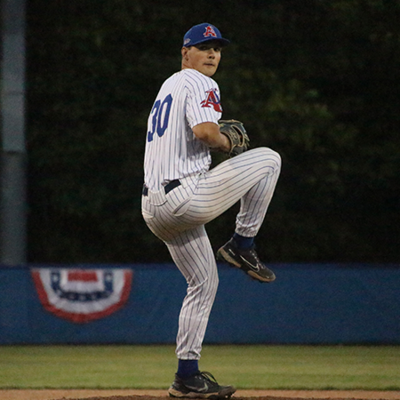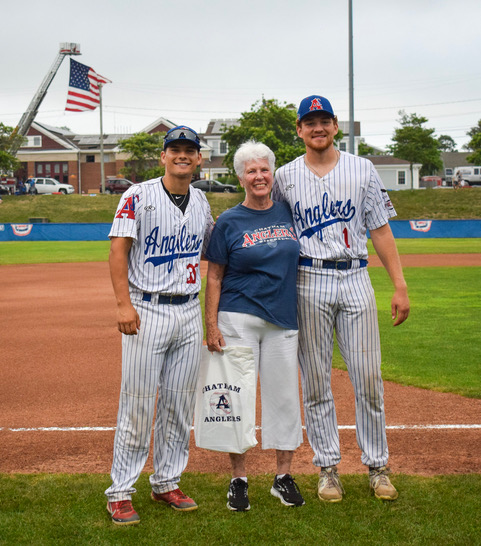Anglers News« Back to 2022 News Archives |
Ben Hampton mastered his pitching style using 'resources' around him

Landing a cutter perfectly inside on a right-handed batter is an art to Ben Hampton. Like a painter stroking a brush, how he holds the ball and winds up his arm can create an original piece at any moment.
'It's a process, that's what makes it an art,' Ben said. 'You can keep getting better.'
Ben has used unorthodox methods he's found on his own to hone his skills as a 'slow lefty,' like when he asked his dad to put a dowel through a baseball so he could practice his spin on the ball. But Ben's curiosity led him to use 'resources' around him to his advantage, blending advice from anyone into his own game. He's used these lessons to become an All-State high schooler in Wisconsin, a Saturday starter at West Virginia and Chatham's most consistent pitcher this summer.
'If there was a 10-year-old that told me I should try this, I would try it,' Ben said. 'You never know who can teach you something, you always just have to listen to people.'
' ' '
Ben stared at a photo of himself plastered on the family's refrigerator. His father, Jeff Hampton, developed a photo of a particular moment from one of his appearances as a pitcher. The then-9-year-old Ben pouted on the mound after he 'didn't meet up to the standard' he set for himself.
Ben was embarrassed by the photo. He didn't like that people visiting the house would see him 'moping.' But it was a reminder that Ben needed to control his emotions on the mound. A reminder that one bad pitch or appearance doesn't define a pitcher, that learning from that adversity is what matters.
'I don't ever remember him doing that anymore,' Jeff said about Ben showing his frustration.
Jeff took the photo down after a few weeks. Most of his lessons didn't come in material form. He preferred to tell 'baseball stories,' having a moral at the end like an Aesop's Fable with a baseball twist.
The tales usually revolved around quotes from some of the best players, like Roger Clemens' saying that 'my only day off is the day that I pitch' or Warren Spahn's, 'Hitting is timing. Pitching is about upsetting timing.'
In high school, Ben could rely on velocity to take out most batters in Wisconsin. But at West Virginia ' and with the Chatham Anglers ' Spahn's mantra has stuck with Ben.
'Changing timing and going on both sides of the plate, up and down, that's when hitting gets tough,' Ben said.
' ' '
The Fox River divides the two parts of town in De Pere, Wisconsin. Each side of the river has its own school district, but kids from both sides joined a travel baseball team named 'De Pere Travelers.'
At 10, players with the Travelers, including Ben, began following major league rules, which let runners lead off bases. Steve Kloehn coached Ben through his pick-off move, focusing on keeping his right leg in the air and using the same tempo as a regular pitch before heaving the ball to first.
Ben grasped the concept quicker than most pitchers, and he learned to not be 'enamored' with throwing to first. He understood that picking off runners was secondary to pitching.
'I would just walk out to Ben and say 'What's your job'' And he would just say 'throwing strikes,'' Kloehn said.
Ben appreciated a three-pitch inning more than a three-strikeout frame. The rules prevented him from going over a certain pitch count, so Khloen built his team to focus on defense, allowing Ben to 'relax' on the mound.
'I don't care if you hit a 120 mph line drive to shortstop, that's an out, and I beat you,' Ben said. 'I get a lot more satisfaction with that rather than blowing a fastball past someone.'
' ' '
Ben wanted to know why Jason Berken told him certain things.
Berken, who opened Impact Sports Academy and went to Ben's alma mater, West De Pere High School, was used to just telling players what to change and seeing them make those changes. But Ben asked Berken why he suggested for him to use a certain tempo or change his grip a certain way on a curveball.
'If I asked him a question there was always an answer,' Berken said. 'There was a deep understanding or commitment to why he was doing certain things.'
Ben also wasn't afraid to speak up, understanding that his mechanics had their own 'Ben Hampton' twist to them.
'You have coaches that know the proper mechanics of how to throw a ball, but some people's bodies just don't move that way,' Ben said. 'We had a great relationship of almost building off each other.'
Ben and Berken collaborated to work on his change-up. He could strike out the best hitters in Wisconsin with his fastball and breaking ball, but Ben wanted to keep progressing as a pitcher. The change-up mirrored off Ben's four-seamer, and the pair worked to make him more confident in using it during games rather than just bullpens.
'Changing to change is not always the answer,' Berken said. 'When you make changes because you have to and not because you need to is the answer.'
' ' '
Ben was already 'lathered' in sweat when West Virginia recruiting coordinator Steve Sabins arrived at the ISA facility at 6 a.m. While most people were still asleep, Berken caught while Ben commanded both sides of the plate. The next day, the Mountaineers made Ben an offer.
Sabins didn't bring a radar gun to the workout, a gesture that reminded Ben about the importance of his uniqueness as a pitcher.
'They cared more about the pitching aspect than just throwing the ball hard,' Ben said.
Berken introduced Ben to the importance of arm care through band workouts, but Nolan Harvath, West Virginia's strength and conditioning coach, took his understanding to the next level.
Ben learned it was okay to lift on the day of his start, moving 'moderate weight as fast as possible' five hours before first pitch. He was interested in his recovery as well, asking Harvath a multitude of questions about what he could do the day after a long outing.
'He is so curious, he's never content or complacent,' Harvath said.
Harvath's answers were most often based on how Ben was feeling, though a remedy for the soreness can be as simple as a brisk walk to 'get the blood pumping.' The pair developed a weekly routine, centered around when he started ' his only 'day off.'. He mostly has it memorized, but it's stored on the Notes app in his phone whenever he needs a reminder.
West Virginia also taught Ben to be his harshest critic, having pitchers fill out a report card the day after each start, reflecting on how they felt, their first pitch strike percentage and what they needed to do better. He hangs out in the dugout, trading the report card for a clipboard to chart each pitch from his teammates. He likes to stay 'locked in' even if he's not on the bump, thinking what he would have done instead with a 1-2 count.
'For guys that think it's a hassle, they're missing out on development, they're missing out on a big piece of the game that helps make them better,' Ben said.
' ' '
Without a report card in Chatham, Ben uses a notebook to grade his performance. He does it immediately after getting home, before his consistent 10 hours of sleep, knowing that sometimes it's hard to get rest because he's thinking about a certain pitch he missed in his previous performance. He writes down his own goals for the week as well, looking to focus on mastering the skills he's added to his arsenal over the years.
'When I get it out of my system, baseball is so mental that you can't let it eat you up like that,' Ben said.
A day before closing against Wareham on July 20, Ben arrived at Veterans Field in slides, basketball shorts and a neon t-shirt. He got into a golf cart and drove to the shed behind the batting cage to pick up a rake and bucket of clay before turning back to the infield.
Meticulously, he repaired the mound before Wyatt Evans' start against Brewster. He came back to watch Evans' pregame bullpen, sitting in a plastic chair next to the bullpen mound. Ben doesn't say anything, he just listens to what the coaches are saying. There's still more to learn.

